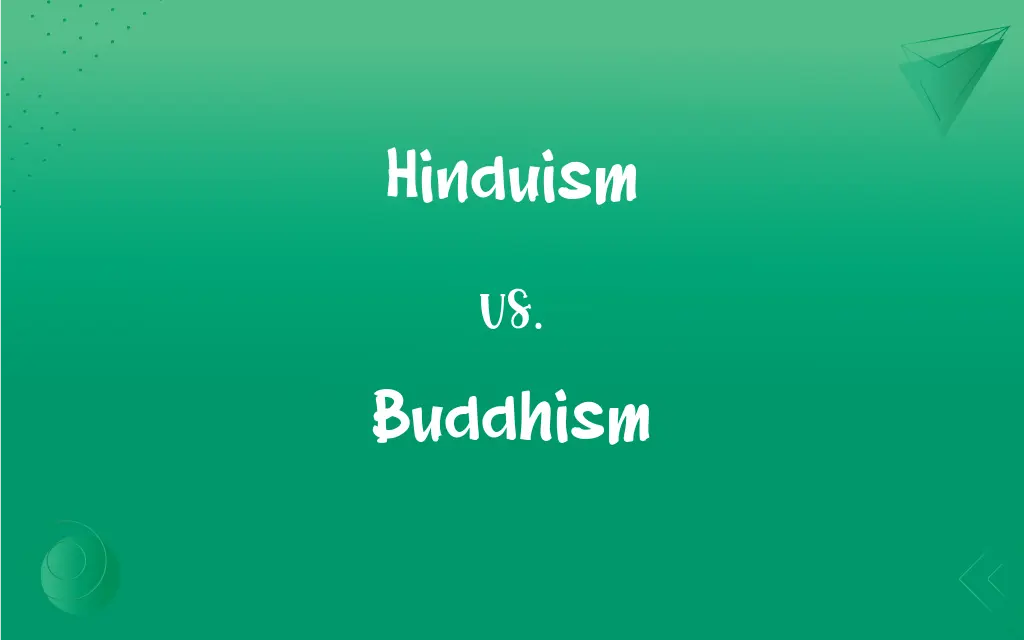Hinduism vs. Buddhism: What's the Difference?
Edited by Aimie Carlson || By Harlon Moss || Updated on October 4, 2023
Hinduism is a polytheistic religion originating from the Indian subcontinent; Buddhism, founded by Siddhartha Gautama, emphasizes the path to enlightenment.

Key Differences
Hinduism, rooted in the Indian subcontinent, is a diverse and ancient religion encompassing a variety of beliefs and practices. Buddhism, on the other hand, is a spiritual tradition founded by Siddhartha Gautama, often known as the Buddha, in northeastern India.
Hinduism holds the Vedas as its foundational scriptures and recognizes many gods and goddesses, representing various aspects of the divine. Buddhism, in contrast, doesn't emphasize worship of deities but instead highlights the teachings of the Buddha and the importance of personal spiritual development.
Hinduism has the caste system embedded in some of its traditional practices, a hierarchical structure of society. Buddhism initially emerged as a reaction to certain practices in Hindu society and rejected the idea of the caste system, emphasizing the potential for enlightenment for all beings.
The concept of karma and rebirth is pivotal in both religions. However, while Hinduism speaks of the soul (atman) being reborn, Buddhism discusses rebirth without necessarily having a permanent soul, centering on the concept of anatta (no-self or not-self).
Hinduism offers various paths like karma (action), bhakti (devotion), and jnana (knowledge) for salvation. Buddhism provides the Eightfold Path, a guideline to ethical and mental development leading to enlightenment and cessation of suffering.
ADVERTISEMENT
Comparison Chart
Origin
Indian Subcontinent
Northeastern India
Scriptures
Vedas
Tripitaka
Deities
Multiple gods and goddesses
Does not emphasize worship of deities
Core Concepts
Atman (soul), Karma, Dharma
Anatta (no-self), Four Noble Truths, Dukkha
Salvation Path
Karma, Bhakti, Jnana
Eightfold Path
ADVERTISEMENT
Hinduism and Buddhism Definitions
Hinduism
Hinduism respects the Vedas as its foundational scriptures.
Reciting verses from the Vedas is a common practice in Hinduism.
Buddhism
Buddhism is a spiritual tradition founded by Siddhartha Gautama, the Buddha.
The principles of Buddhism are outlined in the Four Noble Truths.
Hinduism
Hinduism believes in the eternal cycle of birth, death, and rebirth.
In Hinduism, one's actions determine their fate in the next life.
Buddhism
Buddhism emphasizes personal spiritual development and the path to enlightenment.
Meditation is a fundamental practice in Buddhism for attaining mindfulness.
Hinduism
Hinduism is a major world religion rooted in the Indian subcontinent.
Many people turn to Hinduism for spiritual guidance.
Buddhism
Buddhism teaches the concept of impermanence and suffering (dukkha).
Understanding the nature of dukkha is crucial in Buddhism.
Hinduism
Hinduism has various sects, each with its unique practices and deities.
Shaivism and Vaishnavism are two prominent sects within Hinduism.
Buddhism
Buddhism does not advocate for a permanent soul or self.
The idea of anatta differentiates Buddhism from many other religious beliefs.
Hinduism
Hinduism encompasses a diverse range of beliefs, practices, and traditions.
Festivals in Hinduism are celebrated with enthusiasm and fervor.
Buddhism
Buddhism offers the Eightfold Path as guidelines to ethical and spiritual growth.
Right speech and right action are two aspects of the Eightfold Path in Buddhism.
Hinduism
A religious, philosophical, and cultural tradition that developed in India with the composition of the Vedas, characterized by belief in a supreme being of many forms and natures, by the view that opposing theories are aspects of one eternal truth, by the desire for liberation from earthly evils, and by belief in reincarnation.
Buddhism
The teaching of Siddhartha Gautama that life is permeated with suffering caused by desire, that suffering ceases when desire ceases, and that enlightenment obtained through right conduct, wisdom, and meditation releases one from desire, suffering, and rebirth.
Hinduism
The dominant religion of India; characterized by a caste system anud belief in reincarnation.
Buddhism
The religion represented by the many groups, especially numerous in Asia, that profess varying forms of this doctrine and that venerate Siddhartha Gautama.
Hinduism
A complex of beliefs and values and customs including worship of many gods, especially the Trimurti composed of Brahma the Creator; Vishnu the preserver; and Shiva the destroyer.
FAQs
What are the main scriptures in Hinduism?
The main scriptures in Hinduism are the Vedas.
What is the origin of Hinduism?
Hinduism originated from the Indian subcontinent.
What is the core text for Buddhists?
The core text for Buddhists is the Tripitaka.
Does Buddhism worship a god?
Buddhism doesn’t emphasize worship of deities; it focuses on the teachings of the Buddha.
What paths to salvation does Hinduism offer?
Hinduism offers paths like karma, bhakti, and jnana.
Is the Buddha considered a god in Buddhism?
The Buddha is revered as an enlightened being, not a god, in Buddhism.
Where did Buddhism begin?
Buddhism began in northeastern India.
Do both Hinduism and Buddhism believe in karma?
Yes, both Hinduism and Buddhism believe in the concept of karma.
Are there different sects within Buddhism?
Yes, major sects include Theravada, Mahayana, and Vajrayana.
How have Hinduism and Buddhism influenced each other?
They have interacted historically, with Buddhism introducing certain concepts to Hinduism and vice versa.
Is Hinduism monotheistic or polytheistic?
Hinduism is polytheistic, recognizing many gods and goddesses.
Are Hinduism and Buddhism related?
Yes, Buddhism emerged in a Hindu cultural context and shares certain concepts but also has distinct differences.
Does Hinduism have different sects?
Yes, Hinduism has various sects, like Shaivism and Vaishnavism.
Can someone practice both Hinduism and Buddhism?
While they are distinct paths, some individuals may draw inspiration from both.
How does Buddhism view the self or soul?
Buddhism introduces the concept of anatta, suggesting there is no permanent soul or self.
How does Hinduism view the afterlife?
Hinduism believes in the eternal cycle of birth, death, and rebirth.
What is the primary path in Buddhism for attaining enlightenment?
The primary path in Buddhism is the Eightfold Path.
What is the ultimate goal in Buddhism?
The ultimate goal in Buddhism is enlightenment and the cessation of suffering.
Which is older, Hinduism or Buddhism?
Hinduism is older than Buddhism.
How does Hinduism view the Buddha?
Some Hindu traditions view the Buddha as an incarnation of the god Vishnu.
About Author
Written by
Harlon MossHarlon is a seasoned quality moderator and accomplished content writer for Difference Wiki. An alumnus of the prestigious University of California, he earned his degree in Computer Science. Leveraging his academic background, Harlon brings a meticulous and informed perspective to his work, ensuring content accuracy and excellence.
Edited by
Aimie CarlsonAimie Carlson, holding a master's degree in English literature, is a fervent English language enthusiast. She lends her writing talents to Difference Wiki, a prominent website that specializes in comparisons, offering readers insightful analyses that both captivate and inform.































































